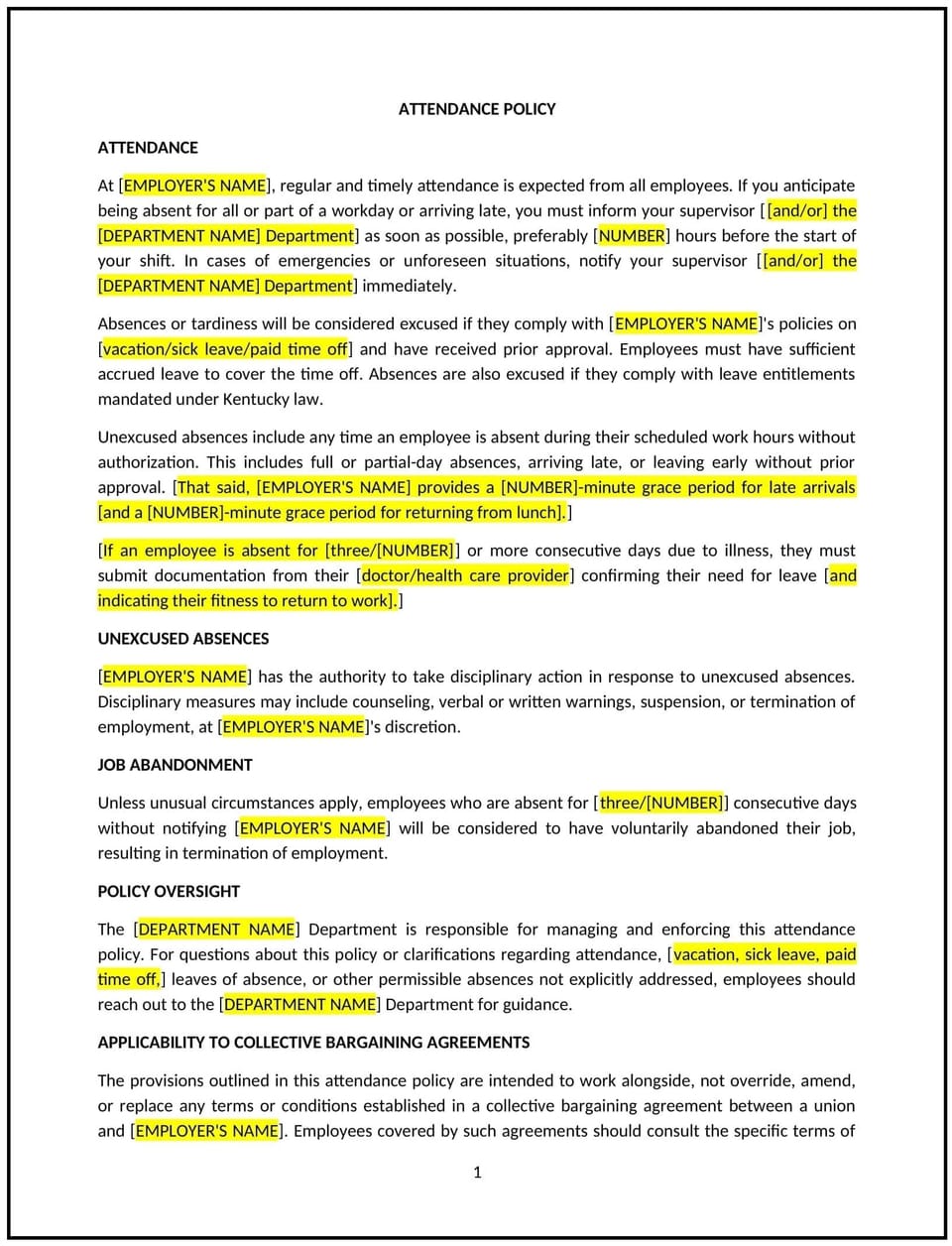Attendance policy (Kentucky): Free template

Attendance policy (Kentucky)
An attendance policy helps Kentucky businesses establish clear expectations for employee attendance and punctuality. This policy outlines the procedures for reporting absences, handling tardiness, and requesting leave, ensuring consistency and fairness across the workplace. It also emphasizes the importance of regular attendance in maintaining productivity and supporting team collaboration.
By implementing this policy, businesses can reduce absenteeism, improve communication, and create a more efficient and reliable workforce.
How to use this attendance policy (Kentucky)
- Define attendance expectations: Clearly explain the importance of regular attendance and punctuality, emphasizing how it contributes to business success and team dynamics.
- Establish reporting procedures: Outline how employees should report absences or tardiness, including the required notice period, whom to contact, and acceptable methods of communication (e.g., phone or email).
- Address acceptable reasons for absences: Provide examples of valid reasons for absences, such as illness, family emergencies, or pre-approved leave, and specify documentation requirements if applicable.
- Include leave request guidelines: Describe the process for requesting time off, including the timeline for submitting requests and any approval requirements.
- Outline consequences for attendance violations: Clearly state the actions the business may take in response to unexcused absences, excessive tardiness, or failure to follow reporting procedures, such as verbal warnings, written warnings, or termination.
- Promote flexibility when appropriate: Include provisions for flexible working arrangements or accommodations, particularly for employees with valid reasons under Kentucky or federal laws.
- Provide management responsibilities: Emphasize the role of managers in ensuring consistent application of the policy and addressing attendance issues fairly.
Benefits of using this attendance policy (Kentucky)
This policy provides several benefits for Kentucky businesses:
- Promotes consistency: Clear guidelines help ensure that attendance rules are applied fairly and uniformly across the organization.
- Improves reliability: Encourages employees to maintain regular attendance, enhancing productivity and team collaboration.
- Reduces conflicts: Provides a structured process for addressing attendance issues, minimizing misunderstandings and disputes.
- Supports compliance: Aligns with Kentucky labor laws and federal requirements, particularly for leaves of absence or accommodations.
- Enhances communication: Encourages open dialogue between employees and management about attendance and scheduling needs.
Tips for using this attendance policy (Kentucky)
- Communicate the policy effectively: Share the policy with employees during onboarding, in handbooks, and through regular reminders to ensure everyone understands expectations.
- Monitor attendance trends: Track patterns in absenteeism or tardiness to identify potential issues and address them proactively.
- Be flexible when necessary: Consider accommodations for legitimate reasons, such as medical conditions or emergencies, while maintaining overall attendance standards.
- Train managers on application: Ensure supervisors apply the policy consistently and handle attendance issues with fairness and professionalism.
- Review and update regularly: Periodically revise the policy to reflect changes in Kentucky labor laws, workplace practices, or business needs.
Q: What is the purpose of an attendance policy?
A: The policy provides guidelines for maintaining consistent attendance and punctuality, helping businesses improve productivity and team collaboration.
Q: How should employees report absences?
A: Employees should report absences by contacting their supervisor or HR as soon as possible, following the procedures outlined in the policy.
Q: What are acceptable reasons for absences?
A: Acceptable reasons include illness, family emergencies, or pre-approved leave. Documentation may be required in certain cases.
Q: How does the policy address tardiness?
A: The policy outlines expectations for punctuality and specifies actions for repeated tardiness, such as warnings or disciplinary measures.
Q: What happens if an employee violates the attendance policy?
A: Employees who fail to follow the policy may face consequences ranging from verbal warnings to termination, depending on the severity of the violation.
Q: Does the policy allow for flexible working arrangements?
A: The policy may include provisions for flexibility, such as remote work or adjusted schedules, based on valid reasons and business needs.
Q: How often should the attendance policy be reviewed?
A: The policy should be reviewed annually or as needed to ensure alignment with Kentucky laws and workplace requirements.
Q: What role do managers play in enforcing the attendance policy?
A: Managers are responsible for applying the policy consistently, addressing attendance issues, and supporting employees in maintaining good attendance.
This article contains general legal information and does not contain legal advice. Cobrief is not a law firm or a substitute for an attorney or law firm. The law is complex and changes often. For legal advice, please ask a lawyer.


